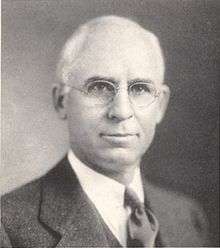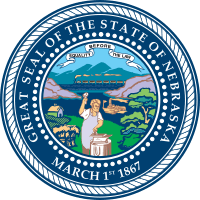Robert Leroy Cochran
Robert LeRoy "Roy" Cochran (January 28, 1886 – February 23, 1963) was a Nebraska Democratic politician and the 24th Governor of Nebraska.
Roy Cochran | |
|---|---|
 | |
| 24th Governor of Nebraska | |
| In office January 3, 1935 – January 9, 1941 | |
| Lieutenant | Walter H. Jurgensen Nate M. Parsons William E. Johnson |
| Preceded by | Charles W. Bryan |
| Succeeded by | Dwight Griswold |
| Chair of the National Governors Association | |
| In office September 14, 1937 – June 26, 1939 | |
| Preceded by | George C. Peery |
| Succeeded by | Lloyd C. Stark |
| Personal details | |
| Born | January 28, 1886 Avoca, Nebraska, U.S. |
| Died | February 23, 1963 (aged 77) Lincoln, Nebraska, U.S. |
| Political party | Democratic |
| Education | University of Nebraska, Lincoln (BS) |
Cochran was born in Avoca, Nebraska and began his education in a sod school house. After graduating from Brady High school, he worked his way through and received a civil engineering degree from the University of Nebraska in 1910.[1] First working for the County Surveyor, he was hired as a surveyor by the Atchison, Topeka, and Santa Fe Railroad. In 1912 he was elected County Surveyor and served in that position until 1916. During World War I, he served two years in the Army Artillery Corps and was discharged with the rank of captain in 1919. He was married to Aileen Gant on March 15, 1919 and the couple had two children, Robert Leroy Jr and Mary Aileen.[2]
Career
Cochran ran for governor of Nebraska and won in 1934, defeating the Republican candidate, Dwight Griswold, by 17,388 votes (50,8% to 47.7%). He was re-elected in 1936, again defeating Griswold, this time by 55.9% to 43.1%. In 1938 he was elected for a third term as governor, defeating the Republican candidate, Charles J. Warner, by 44% to 40.6%; a third candidate, Charles W. Bryan, received 15.4% of the vote. This made him the first governor to serve three consecutive terms.[3] In 1940 he ran unsuccessfully for Nebraska senator, unseating incumbent Edward R. Burke in the Democratic primary, but losing the general election to Hugh Butler by 57% to 41.5%.
Cochran served as a colonel in the U.S. Army during World War II from 1941 to 1942 at Camp Leonard Wood, Missouri. He became Assistant Commissioner of the Federal Public Housing Authority from 1942 to 1943, and Commissioner from 1943 to 1944. He served as Deputy Commissioner of the American Mission for Aid to Greece.[4] He retired from public life in 1956.
Death and legacy
Cochran died on February 23, 1963 and is interred at Lincoln Memorial Park in Lincoln, Nebraska.[5] He was a member of the Episcopal Church, a Freemason, Knight Templar, Shriner, and member of Alpha Tau Omega.
References
- "Robert Leroy Cochran" (PDF). Nebraska History.org. Retrieved September 24, 2012.
- "Robert Leroy Cochran" (PDF). Nebraska History.org. Retrieved September 24, 2012.
- Robert Leroy Cochran. Encyclopedia of Nebraska. January 1, 1999. ISBN 9780403098347. Retrieved September 24, 2012.
- Robert Leroy Cochran. Encyclopedia of Nebraska. January 1, 1999. ISBN 9780403098347. Retrieved September 24, 2012.
- "Robert Leroy Cochran". Find A Grave. Retrieved September 24, 2012.
External links
- "Cochran, Robert LeRoy". The Political Graveyard. Retrieved January 6, 2006.
- Encyclopedia of Nebraska
- National Governors Association
- Nebraska History.org
Further reading
Grimes, Mary Cochran, Aileen and Roy: From Sod House to State House (Lincoln: University of Nebraska Press, 2010).
| Party political offices | ||
|---|---|---|
| Preceded by Charles W. Bryan |
Democratic nominee for Governor of Nebraska 1934, 1936, 1938 |
Succeeded by Terry Carpenter |
| Preceded by Edward R. Burke |
Democratic nominee for U.S. Senator from Nebraska (Class 1) 1940 |
Succeeded by John Mekota |
| Political offices | ||
| Preceded by Charles W. Bryan |
Governor of Nebraska 1935–1941 |
Succeeded by Dwight Griswold |
| Preceded by George C. Peery |
Chair of the National Governors Association 1937–1939 |
Succeeded by Lloyd C. Stark |
